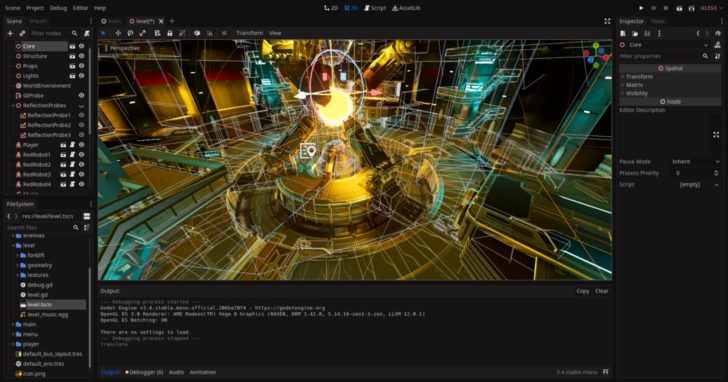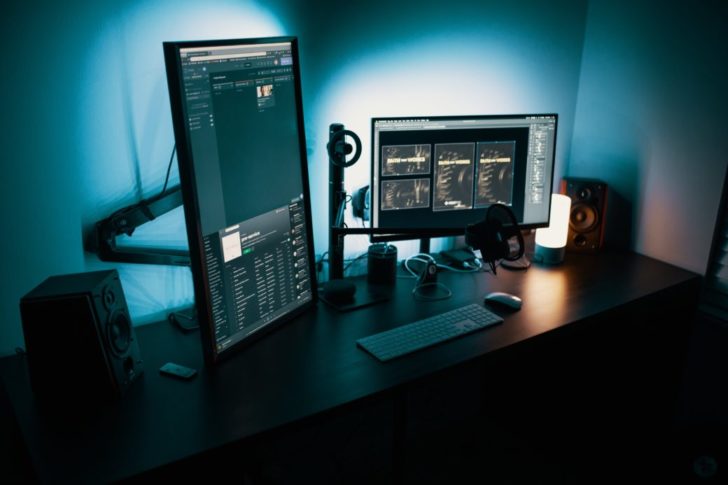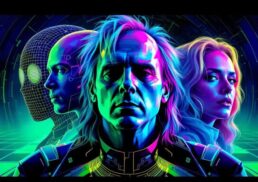Are you ready to embark on an exciting journey into the world of game development using the versatile and powerful Godot game engine? In this blog post, we will dive into the features, capabilities, and resources available for learning and mastering this free, open-source engine. Let’s discover how Godot can help you create engaging and successful games, regardless of your experience level or budget.
Table of Contents
Key Takeaways
Explore the Godot Game Engine for cost-effective, cross-platform game development.
Leverage comprehensive tutorials and resources to maximize its potential and overcome limitations.
Real world success stories of games created with Godot showcase its power & versatility.
Exploring the Godot Game Engine

Godot is a comprehensive, cross-platform game engine, originally created by Argentine software developers Juan Linietsky and Ariel Manzur. With its unified interface, Godot allows developers to create both 2D and 3D games, supporting a vast array of languages and exporting games to multiple platforms. This feature-packed engine provides a comprehensive set of standard tools, enabling users to focus on making games without reinventing the wheel.
Godot’s attractiveness to game developers worldwide stems from its:
Cost-effectiveness brought about by its free and open-source nature
Release under the permissive MIT license, devoid of any strings attached
Strong community support
Cross-Platform Compatibility
Godot’s effortless cross-platform compatibility enables developers to craft games for various platforms with ease, including:
Major desktop platforms (Linux, macOS, Windows)
Mobile platforms (Android, iOS)
Web-based platforms
Consoles
This compatibility is further augmented by the engine’s constant updates, which introduce new features to keep up with the evolving world of game development.
Godot’s permissive MIT license grants developers unrestricted use of the engine, facilitating their focus on creating immersive games across various platforms without licensing concerns. This opens up endless possibilities with Godot.
2D and 3D Game Development
Godot supports both 2D and 3D game development, providing a versatile engine for various types of games. The primary distinctions between 2D and 3D games include:
Graphics
Complexity
Gameplay
Development challenges
Genre differences
Godot offers a variety of tools for game development, such as visual scripting, which simplifies the process of creating complex game logic.
3D game development in Godot can indeed be challenging, given the complexity of the 3D environment and the need for efficient rendering. However, the user-friendly Godot editor presents a streamlined interface for efficient creation and management of game projects. Developers can leverage available resources and community support to overcome these hurdles and craft successful 3D games with Godot.
Learning Godot: Comprehensive Tutorials and Resources

A comprehensive range of tutorials and resources exists for those wishing to learn Godot, including official documentation and demos, as well as community-driven learning channels. These resources provide invaluable knowledge and insights into the engine, helping developers at all skill levels master the intricacies of Godot and create engaging games.
Detailed information about the engine is available in the official Godot documentation, supplemented by several demonstrations that aid users in their initial steps. Moreover, the highly active Godot community provides an abundance of resources, including:
Tutorials
Forums
Online courses
YouTube channels
Discord servers
Developers can utilize these resources to gain the knowledge required for effective use of Godot, paving the way for successful game creation.
For more information, please visit Godot Comprehensive Tutorials and resources
Official Documentation and Demos
You can access the official documentation for Godot on their website, which provides comprehensive coverage of the engine and its features. This documentation serves as an excellent starting point for developers seeking to gain a solid understanding of Godot’s capabilities.
Official demos for Godot are also available in their GitHub repository, allowing developers to explore the engine’s features and functionalities through hands-on examples. These demos, combined with the extensive official documentation, provide a valuable foundation for learning and mastering the Godot engine.
Community-Driven Learning Channels
Community-driven learning channels, such as YouTube tutorials and forums, offer a wealth of resources for enhancing your Godot skills and knowledge. These channels provide hands-on techniques that can be beneficial for young, aspiring game developers who may not be able to learn them in a class or school setting.
Examples of these channels include Gamesfromscratch, GDquest, and KidsCanCode. Each of these channels offers a unique perspective and approach to teaching Godot, catering to different learning styles and preferences. By exploring these community-driven learning channels, developers can enhance their Godot expertise and create engaging, successful games.
Advantages of Using Godot
Godot’s development is community-driven, with a vibrant and active group of developers and enthusiasts who contribute to the engine’s growth and offer support to new users. This strong community support, combined with its free and open-source nature, makes Godot an attractive choice for game developers.
Godot, released under the MIT license, facilitates developers’ focus on crafting engaging games, free from licensing worries. Its status as a free and open-source platform for game development is further reinforced by the support of the Software Freedom Conservancy.
Free and Open-Sourced
Godot is a completely free and open-source game engine, allowing developers to create games without any financial constraints or limitations. This freedom and flexibility make it an ideal choice for developers who want to focus on creating immersive games without being hindered by licensing issues.
Godot’s release under the very permissive MIT license allows developers to retain and maintain their work without limitations. This empowering licensing model enables developers to realize their creative visions using the robust and adaptable Godot game engine.
Strong Community Support
Godot boasts a strong community of developers and enthusiasts who actively contribute to its development and provide support to new users. This vibrant community offers a plethora of resources, such as tutorials, demos, and official documentation, to help developers overcome any challenges they may face while using the engine.
Despite its smaller size compared to other game engine communities, the Godot community’s high engagement level and support for newcomers render it an invaluable resource for developers. Utilizing this vigorous community support allows developers to navigate and overcome any hurdles or limitations they may face while using the Godot engine.
Overcoming Godot’s Limitations
Godot has certain drawbacks, such as difficulties with 3D game development and a steep learning curve. However, by leveraging the available resources and community support, developers can overcome these limitations and maximize the potential of the engine for creating engaging and successful games.
Godot provides a plethora of resources, including official documentation, demos, and community-driven learning channels, that developers can use to tackle the engine’s limitations and facilitate a smooth game development process. By utilizing these resources and the knowledge disseminated by the Godot community, developers can confront any challenges head-on and create compelling games.
Handling 3D Game Development Challenges
3D game development in Godot can present challenges, such as the complexity of the 3D environment and the requirement for efficient rendering. However, with the available resources and community knowledge, developers can overcome these challenges and create successful 3D games.
Strategies to address the difficulties of 3D game development include:
Selecting the appropriate game design and development framework
Ensuring comprehensive documentation
Working collaboratively with different parties
Encouraging diversity of ideas and creative design methodologies
By employing these strategies and leveraging the Godot community’s support, developers can tackle the challenges of 3D game development and create engaging, successful games.
Easing the Learning Curve
Godot’s learning curve can be daunting for novices. However, the availability of comprehensive tutorials and community-driven learning channels can simplify this process, enabling developers to rapidly gain proficiency with the engine.
The Godot community provides a variety of learning channels, including forums, tutorials, and video tutorials, to help developers master the engine and its intricacies. By exploring these resources and actively engaging with the Godot community, developers can overcome the learning curve and create captivating, successful games.
Real-World Success Stories: Games Created with Godot
Many games created with Godot have achieved success in the real world, showcasing the engine’s capabilities and potential for creating engaging and successful games. Notable titles created with Godot include:
TailQuest Defense by Kivano Games
Cassette Beasts by Bytten Studio
Halls of Torment by Chasing Carrots
Lumencraft by 2Dynamic Games
Madness/Endless
These real-world success stories demonstrate the power and versatility of the Godot game engine, proving that it is capable of creating immersive and successful games across various genres and platforms. The success of these games is a testament to the engine’s capabilities, the strong support provided by the Godot community, and the overall performance of game engines like Godot.
Aspiring game developers can garner valuable insights and inspiration for their own projects by studying these successful games and their development processes. These examples underscore the fact that, armed with dedication, hard work, and the right resources, developers can create captivating games using the Godot engine and even develop games that leave a lasting impact on the industry.
Summary
In this blog post, we explored the features, capabilities, and resources available for learning and mastering the Godot game engine. From its free and open-source nature to its strong community support, Godot offers a powerful and versatile platform for game developers at all skill levels. By leveraging the available resources and community knowledge, developers can overcome any challenges they may face and create engaging, successful games. With the power of Godot at their fingertips, the possibilities are truly endless.
Frequently Asked Questions
What is Godot used for?
Godot is a general-purpose 2D and 3D game engine that supports various projects, making use of programming languages such as C++, C# and GDscript.
It allows developers to create 3D and 2D games using a hierarchy of nodes, which can be derived to create more specialized node types.
What coding language is Godot in?
Godot is officially supported by four languages: GDScript, C#, C and C++. Of these, GDScript is the most common and favored due to its simple, elegant design and integration with Godot.
Why does Tesla use Godot?
Tesla uses Tesla’s electric motor. Godot to easily develop their products with its simple GDScript programming language, which is easier to learn than other all-purpose languages.
It also allows Engineering Inc. to visualize and navigate cloud assets with an intuitive experience.
Why is Godot so easy?
Godot offers various tools to make game development easy for beginners, such as its visual scripting tools, GDScript readability and intuitive nodes.
With no previous experience, Godot is easy to get started with.
Which games use Godot Engine?
Notable games such as Sonic Colors: Ultimate, Endoparasitic, cassette beats, The Legend Of Lumina, Friday Night Funkin; VR, ProtoCorgi, Nightmare In Squidville, Kivano Games, Bytten Studio, Chasing Carrots, 2Dynamic Games, Poke the Ant, Save Sloth Studios, Miziziziz and Bippinbits have all been created using the Godot Engine.









